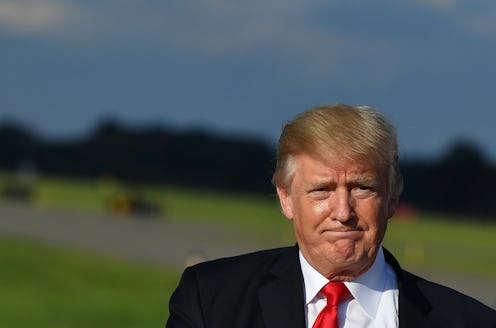News
Trump’s Lawyers Discover The Single Dumbest Way To Get Quoted In A Newspaper

President Trump and his administration regularly and loudly denounce leaks to the press, and the frequency with which sensitive information makes its way from the executive branch to news headlines has been a source of aggravation for the president and his supporters. But some of that damage may be self-inflicted: Recently, a Trump lawyer complained about leaks in public — and was overheard by a nearby reporter, who proceeded to publish the contents of the conversation.
On Sunday, the New York Times' Ken Vogel was seated next to Ty Cobb and John Dowd, two Trump attorneys managing the administration's response to the Russia investigation, at the popular D.C. restaurant BLT Steak. According to Vogel, the two were "casually & loudly discussing" the details of the Russia investigation, including to what extent they should cooperate with requests from special counsel Robert Mueller, who's leading the investigation.
During the lunch, Cobb reportedly referred to an unnamed White House attorney as "a McGahn spy;" that's a reference to White House Counsel Don McGahn, who's also working on the Russia investigation. But Cobb and McGahn aren't supposed to be adversaries; they're on the same team here, at least ostensibly. The fact that one White House lawyer would imply that another White House lawyer has spies within the White House's legal team suggests that there may be some internal friction between Trump's many lawyers.
Vogel also says that the two Trump lawyers discussed the prevalence of leaks in the White house, with Cobb blaming another unnamed colleague for "some of these earlier leaks" and suggesting that this colleague "tried to push Jared out."
That's a reference to Trump's son-in-law and top advisor Jared Kushner. According to the Wall Street Journal, certain members of Trump's legal team suggested over the summer that Kushner should leave his White House post, arguing that his presence complicated the administration's response to the Russia investigation and hindered Kushner's ability to do his job. Cobb confirmed to theWashington Post that there were "clandestine efforts to undermine" Kushner, but that those "focused on sabotaging him and his family for misguided personal reasons are no longer around." Kushner ultimately wasn't forced from his job at the White House.
The Times says that when after it asked the White House for comment on the overheard Cobb-Dowd conversation, McGahn "privately erupted" at Cobb, while White House Chief of Staff John Kelly "sharply reprimanded" Cobb for discussing such sensitive matters within earshot of a political reporter. It's unclear whether Dowd received any such reprimand.
The bulk of the Cobb-Dowd conversation — at least, the part that Vogel overheard — seemed to focus on the Russia investigation, and how to handle Mueller's requests for documents from Trump and his associates. According to the Times, Cobb has been arguing that the administration should readily give Mueller the documents he's requested, the theory being that this will expedite the investigation and allow it to finish sooner, rather than later. McGahn, however, has reportedly urged a more cautious response to the investigation. So far, the White House has not refused any of Mueller's document requests.
Perhaps most intriguingly, Cobb reportedly told Dowd that McGahn had "a couple documents locked in a safe," and implied that he would like to access them. Although it's unclear what these documents are — or indeed, if they even exist — the mere fact that Cobb would accuse McGahn of such a thing speaks to the degree of internal tension within the White House legal team.
In any event, this episode is a perfect microcosm of the larger debate over executive branch leaks. Although the Trump administration regularly and loudly complains about the media publishing sensitive information, the media is only able to do this because government officials are deciding to speak to the press — or, in this instance, loudly having what should be a confidential conversation in public. The White House can decry leaks to the media all it wants — but ultimately, it takes two to tango.